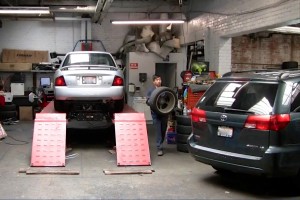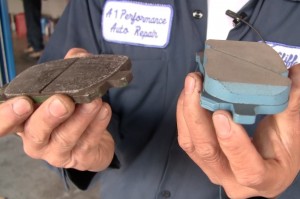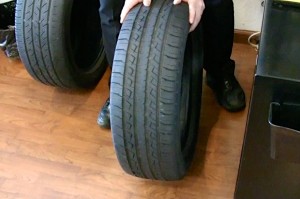
By taking a proactive approach to maintenance, you can make the most of your vehicle investment. Photo: Faxon Garage (2014)
Let’s face it: in this day and age, a vehicle is more than just a means of transportation—it’s an investment, and a substantial one at that. From the price of engine repair and body work to ongoing fuel and insurance costs, owning a vehicle constitutes a major financial obligation, which is all the more reason to be proactive about maintenance. With this in mind, we asked five Diamond Certified Expert Contributors to weigh in on key areas where maintenance matters most.
1. Engine fluids – Lyde Waitley, owner of Olsen’s Automotive Repair
To maintain ongoing functionality of the engine and other components, a vehicle requires numerous fluids, including engine oil, coolant and transmission fluid. What’s more, when these fluids run dry, it can result in everything from premature wear to catastrophic damage. Checking fluid levels on a consistent basis and having them routinely changed and replenished will go a long way toward keeping your vehicle running optimally.

A crucial part of maintaining brakes is being able to tell when they need to be replaced. Photo: A1 Performance Auto Repair (2014)
2. Brakes – Cliff Do, owner of A1 Performance Auto Repair
Many modern cars feature brake pad wear sensors, but if your vehicle isn’t equipped with such a warning device, you need to have your brakes inspected annually. Operational indicators of worn brakes include increased vehicle stopping time and a metallic squeaking noise when the brake pedal is applied. In addition to safety concerns, ignoring these warning signs can result in the need for more extensive—and more expensive—repairs.
3. Tires – Walee Gon, president of Faxon Garage
Keeping your vehicle’s tires properly inflated delivers several benefits, from improving fuel economy to ensuring safety on the road. Tire pressure is prone to fluctuate, so you should monitor it on a frequent basis. It’s also important to promptly replace tires that have become worn out, particularly in winter when their wet weather traction can be compromised.

When a vehicle’s shocks fail to properly function, it can lead to problems like uneven tire wear. Photo: Orinda Motors, Inc. (2014)
4. Shocks – John Vanek, manager of Orinda Motors, Inc.
In addition to diminishing vehicle performance, worn shocks can lead to uneven tire wear and require components like brakes to work harder. An easy way to assess the functionality of your shocks is to check your ride control: if your vehicle rides rough, with a lot of body roll, sway and bouncing, it’s likely time for new shocks. Additionally, since shocks have an average lifespan of 50,000 miles, if your car has anywhere near 100,000 miles and you’ve never replaced them, you’re probably past due.
5. Scheduled maintenance – Javier Magallanes, manager of Magallanes Automotive
One of the most important things you can do to ensure the ongoing health of your vehicle is to adhere to its manufacturer-recommended maintenance schedule. Outlined in the owner’s manual, a vehicle’s maintenance schedule ensures vital services occur at predetermined milestones. For example, with most vehicles, the 90,000-mile service calls for replacement of the engine timing belt, which is a crucial component of operation. When combined with the aforementioned maintenance aspects, keeping up on your vehicle’s maintenance schedule will maximize both performance and longevity.
One Response
Leave a Reply
You must be logged in to post a comment.

Thanks for the tips! My car seems to be going through more gas than usual, so it seems like I should be taking better care of my car. You made a great point about how keeping my tires inflated properly can help to improve my fuel efficiency. I need to check the air levels on my tires, so it seems like I should get to it in order to help my car use less gas.